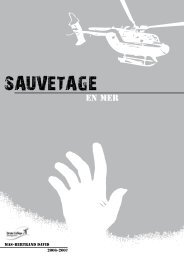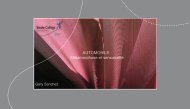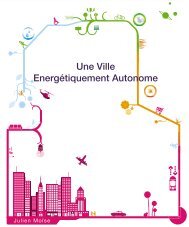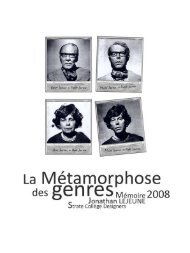Mémoire - Strate Collège
Mémoire - Strate Collège
Mémoire - Strate Collège
You also want an ePaper? Increase the reach of your titles
YUMPU automatically turns print PDFs into web optimized ePapers that Google loves.
SUMMARY<br />
Journeys and means of transport have become present everywhere in our<br />
modern societies. Those modern means of transport, now affordable by<br />
everyone, can be the first step of an adventure as much as its conclusion:<br />
we can be going to an unknown place or going back to our daily life. Our<br />
experience of this disp lacement influences a lot our behaviour during the<br />
trip.<br />
This dissertation is trying to explain our perceptions and interactions with<br />
our environment during transports.<br />
The first chapter is about he trip itself. Studying the different means of<br />
transport evolutions is necessary to understand what brought us to modern<br />
collective transport. Since medieval pedestrian displacement we have been<br />
searching more and more efficiency. We have been looking for straight<br />
speed, and created high-speed trains.<br />
However this research of speed could perhaps stand up against some of the<br />
trip purposes.<br />
Modern passengers wish to be brought from one point to another one as fast<br />
as possible. Indeed in our modern societies people are often stressed by time.<br />
But this speed addictions put aside some of the trip psychological functions<br />
such as discovering, learning, being lost and searching for its way.<br />
Even if very effective, modern collective transport shows a few imbalances.<br />
Means of transport have become simple and common tools, although they<br />
were perceived during industrial revolution as nearly fantastic.<br />
Passengers are looking for occupation, such as films, because of this<br />
standardization. They forget the main purposes of the trip: movement and<br />
discovery.<br />
Our perceptions are exacerbated because we have left an ordinary and daily<br />
environment. Unknown places keep us awake.<br />
We can easily delude ourselves about our perceptions. Although time is<br />
defined in a metric way in our modern societies, we feel it very differently,<br />
for example if we are doing something or not.<br />
Space is also interpreted by our cognition mechanisms; we do not control<br />
the illusions we feel. We can resent displacement without moving of an<br />
inch.<br />
At last perceiving other people is also a changeable phenomenon. We set up<br />
our judgement based on our mood and on the context.<br />
In order to be effective, collective transports have become rigid. We undergo<br />
fixed timetables and obligatory reservations. Nevertheless our perceptions<br />
are very changeable.<br />
Therefore studying human behaviour in society would be interesting. Indeed<br />
our behaviour is linked to our perceptions.<br />
We can see that more and more products such as headphones are conceived<br />
in order to help people to isolate themselves in public areas. There’s a gap<br />
between ourselves and public areas. Those two spaces have to interact, the<br />
border has to be supple.<br />
First of all the example of the Easter Island shows that a population needs<br />
supple frontiers to survive. However despite the danger of strict borders for<br />
a whole population, inside a group people want to isolate themselves from<br />
the others and to have an identical space, such as avatars on the web.<br />
Lastly comfort is directly linked to the possibility of moving our body. This<br />
possibility in mainly provided by supple objects.<br />
During a journey, transport is not only a displacement. It prepares ourselves<br />
to meet unknown places and unknown people. Therefore displacement has<br />
its own function.<br />
Modern transport has been associated to a simple displacement tool, without<br />
minding about the physical and psychological functions and consequences<br />
of the displacement.<br />
The righteous of those modern means of transport seems to compromise the<br />
daydreaming discovery as much as the possibility of movement we need to<br />
feel comfortable.<br />
In the case of collective transports, such as planes or trains, studying products<br />
taking into account our perceptions and our suppleness wishes seems to be<br />
an interesting research direction.<br />
66 / 70 67 / 70










